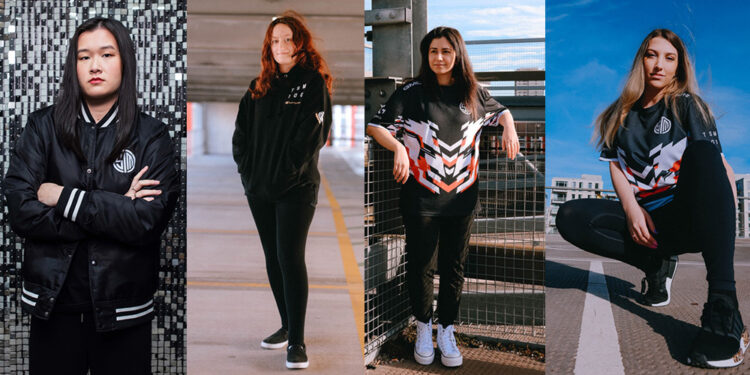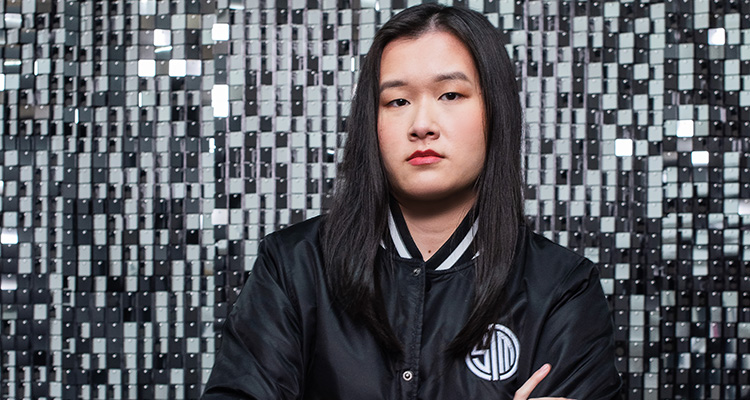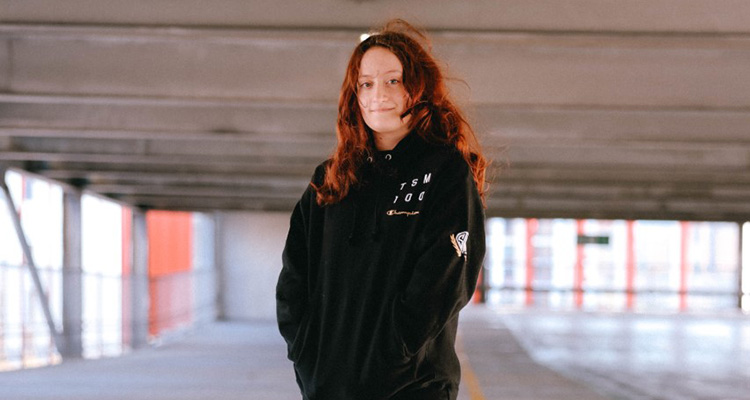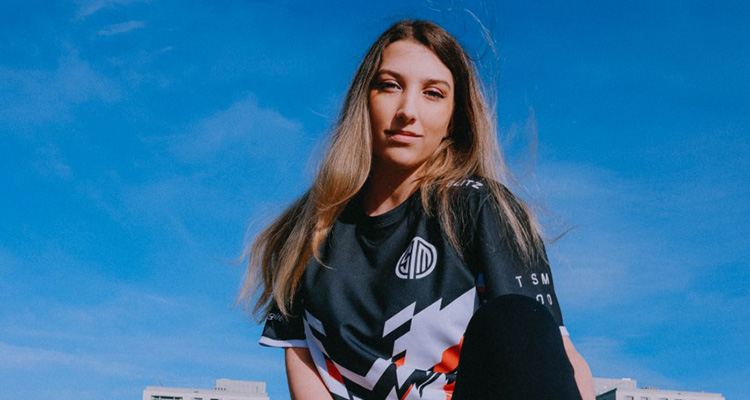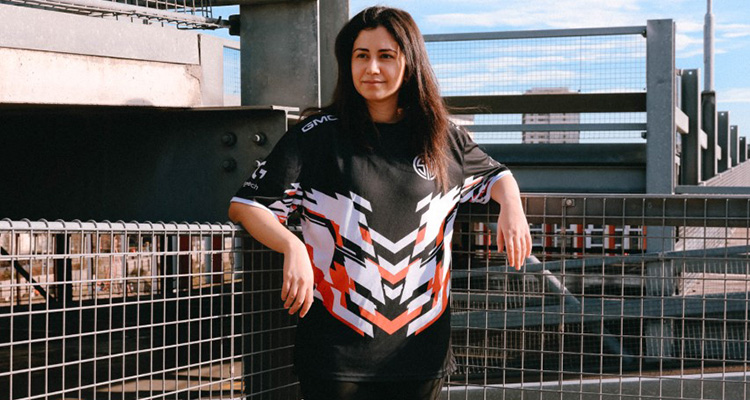At the end of January, TSM signed an all-women roster to take aim at the Apex Legends competitive scene. The new squad consists of some of the best players in the scene including Jane “Janey” Newstead (who joined TSM in June 2021 as a content creator), Laurice “GuhRL” Habibi, Isabella “Avuhlie” Rivera, and Kornelia “Sabz” Zawistowska.
While it already has an active roster competing in the Apex Legends Championship Series (ALGS), TSM Head of Marketing SM Lahti tells The Esports Advocate that having an additional all-women roster dedicated to the game affords its players a greater amount of flexibility to compete in multiple competitions across the landscape, both as individuals and as a team:
“As TSM pro players, Janey, Sabz, Avuh, and GuhRL have a lot of flexibility to play as a team or as individuals, depending on the tournament,” Lahti said. “We want to make sure as players they have the opportunity to compete as pros within multiple tournament circuits and on teams that make them both comfortable and competitive. As an org, we are focused on the competitive, professional, and personal needs of all our athletes and creators and continuing to build a home for those who want to compete at the highest level.”
And while it is too early to say emphatically that the organization will launch other all-women rosters, Lahti thinks there are always new opportunities to explore in competitive esports, regardless of the gender makeup of a squad: “TSM has had a Game Changers team and supports multiple women as content creators. As for the future, we’re always looking to support players with strong potential, regardless of their gender.”
Knowing where TSM stands and what its thinking is in launching this new roster, TEA spoke with Laurice “GuhRL” Habibi, Isabella “Avuhlie” Rivera, Kornelia “Sabz” Zawistowska, and Jane “Janey” Newstead earlier this month about some general topics such as why they want to play Apex Legends competitively over other battle royale games, what harassment or toxicity (if any) they have experienced from their own communities and in the competitive scene, and if women need their own special tournaments or leagues to succeed or to gain greater exposure.
Why Apex Legends?
Pictured: Janey. Credit: TSM
First, the big question for these players: Why Apex Legends over other battle royale games such as Fortnite, Call of Duty Warzone, or even PUBG.
For Avuhlie, Apex Legends was just a natural choice because she has been a longtime fan of Respawn’s games, and wasn’t really interested in most other games as an Xbox player: “I grew up with Respawn Games, so it just kind of felt right. I wasn’t invested in any other games as I was an Xbox player and I just didn’t find anything else interesting. I played TitanFall growing up and I was told that Respawn had a new shooter, so I was like, ‘Oh my God, I’ll go try it.’ That’s pretty much it—I’ve been on it ever since.”
Sabz has played other BRs like Warzone, but prefers playing Apex Legends over those other games because of the movement and flow of the action—plus there’s less camping going on: “I love the movement in Apex a lot better than in other games, and I think the other thing is that too many people are camping and waiting until you’re going to come to them—instead they like to fight. Warzone is typically ‘I’m just running, I’m meeting camping people, and I’m just dying to that.’”
As a longtime first-person shooter fan, GuhRL likes playing Apex Legends because of the fast pacing and the need for quick decision-making skills: “When I play in video games, there’s a certain level of enjoyment I have right off the bat when I like something, and with Apex Legends, I got hooked immediately. I really like fast-paced shooters because I grew up playing a lot of Call of Duty and it gave me the same vibes—quick decision-making while also being an FPS—and it felt really good to play.”
Janey has played those other BR games in the past, but felt that she missed the height of popularity with those titles. She also got the impression that Warzone plays like a casual version of Call of Duty games she has played in the past, such as Modern Warfare 3 and Black Ops 2: “I didn’t want to miss out on Apex when it first launched, and then I just really liked it over Fortnite. For me, Warzone felt more like a casual game. I played it and I was pretty good at it, but then I stopped when I moved over to PC.”
Harassment and Toxicity
Pictured: Avuhlie. Credit: TSM
Surprisingly, when I asked all four women if they had experienced a lot of toxicity while playing competitively or even from their own communities as content creators, most said that the negativity they have encountered has been minimal, and a majority of it isn’t because they are women—it’s just the typical smack talk and rough banter associated with most competitive scenes.
Avuhlie told us that, while everyone gets their fair share of “weirdos and creeps,” her audience is kinder to her because she is very open with them: “The content creator community has taught me to be open. If you’re open with your chat, they’re more understanding,” she said, adding that “they’re adorable and I love them.“
As for the competitive scene, Avuhlie also thinks that things are getting better for women, but there’s still a lot of growing left to do: “I’d say things have gotten a little bit better with Riot making their Game Changers scene and the Apex community making their own community-funded Women’s League. I definitely think that the reception towards women in gaming is getting better. It’s not perfect, but it is getting better. It is making more progress and being more widely accepted by everyone.”
Sabz told us that the Apex community has been very kind to her, and that she finds that the bigger challenge for her is in just being a player trying to find a great squad to fit in and compete with: “It doesn’t mean [people] don’t like you,” she said concerning finding the right group to compete with, adding that “it just means that you don’t play well together and that’s okay. Sometimes even really good players when they get together, they don’t play well as a team.”
GuhRL said that—no matter what— you are going to experience some toxicity, but not necessarily just associated with being a woman creating content or competing: “As a content creator you always go through your lows—there’s always moments where people don’t treat you the best. And that’s not just in content creation, that’s in the world, in everyday life. I just tend to focus on the good because there’s no reason to waste your time with the bad.”
Janey told us that she hasn’t experienced too much toxicity from her own community, but in the gaming scene, you’re going to experience it to some degree. She first noticed an uptick in negativity when her viewer and followers counts started to grow: “I would say the only time I’ve really dealt with a lot of negative comments was when I first started getting a bigger following, because for me—compared to some other creators—it happened very quickly in a six-month span. I don’t feel like it had anything to do with being a woman, it was just in general.”
She also said that when it comes to competing, she hasn’t experienced all that much toxicity but she has learned that—because of her growing following—the things she says and does have more weight to them: “I wouldn’t say they [other players, the community] are toxic towards me, but because of my following a lot of times when I say or do something, people take it a lot more seriously. I have to be a little bit more careful with how I present myself.”
The Importance of Having All-Women Teams and Competitions
Pictured: Sabz. Credit: TSM
Journalists often ask executives or look to the community to gauge the reaction to esports organizations having teams composed entirely of women, girls, and other marginalized groups (and these are important perspectives to pay attention to), but it is a rare occasion when someone asks the people these initiatives can have an impact on: actual players. We asked all of the players if women-only teams are necessary and what benefits they afford over playing on mixed teams (men and women).
Avuhlie says that she has had no problem competing with men, or in a mixed team setting, but can understand that some women need a safe place to start out: “I have absolutely no issue competing with [or in] mixed teams. It’s completely fine—I’ve done it for years, so I have no issue with it—but I would love to see more of these girls just taking the chance and the opportunity to go play the normal league route. You don’t really see that; it’s a very select few that actually make the effort to go out and find a team for ALGS. I don’t know whether it’s because they’re afraid to look for their own group or if they’re scared to put themselves out there and say ‘Hey, you can trust me as a player, let me try and be on your team’ kind of thing.“
Sabz also has no issue with playing in regular competitions, but thinks it is a lot easier for a woman to start out with other women, for a number of reasons: “Overall, I think it’s easier for women to start by having other women with you because I think some women are just scared that men are going to criticize them a lot. That means it’s a lot easier at the beginning if there are other women around. I didn’t have that when I started—I started playing with men—but I learned quickly that they don’t want bad things for me, they just want me to improve. If they’re criticizing me in this way it is so that I can improve; It’s not like they are saying ‘You’re terrible just because you are a woman.’”
GuhRL, who currently subs for the TSM squad, said that she has always played on mixed teams but sees the importance of playing on an all-women team for some players: “I don’t necessarily know if there is an advantage to that for me because I’ve been playing mixed teams my whole life. I think for others, if they don’t feel comfortable in a mixed team situation and feel maybe less looked down upon or less scared to play in the all-women scene because there might be less judgment for them.”
Janey thinks that having a space dedicated to women is important to provide a comfortable space to learn the ropes without judgment: “It’s not like we need our own league or team because we can’t compete against men. It’s there because it’s hard to find a team as a woman. Also, it’s just there for comfort, just to give women a head start, to show them what they should expect in a competition, and how they can learn in a comfortable space.”
The Need for Women-Only Leagues and Tournaments
Pictured: GuhRL. Credit: TSM
While all of the players agree that women don’t “need” a special league or tournament, there are a lot of benefits to having them, including additional opportunities to compete, greater visibility to the community-at-large, and generally a more comfortable space for those competitors that might not necessarily feel all that welcomed elsewhere.
Sabz thinks it gives women a spotlight to shine: “I think it helps women show what they can do, how great they are at playing. Other people are also watching that, so everyone can see how well someone is playing—she’s taking good angles and stuff. I wouldn’t say ‘women need it.’”
Janey echoed Sabz in that it would be cool to have more opportunities, but it’s not a needed imperative: “I feel like if there were more leagues and tournaments for women, we would have more teams—depending on sponsorships and stuff like that. I don’t think ‘we need it.’ I think it’d be cool.”
GuhRL thinks that the more opportunities there are the better it is to grow the scene: “I think that having an all-women’s competitive scene can be really inspirational to other women trying to get into it. I think that it also can be a space to help them grow and get better in their own way and improve their skills. For me personally, it would be much nicer to have a women’s scene [more tournaments] with prize pools, because when there’s no prize pool, people don’t play to their utmost best and they don’t take it too seriously.”
Avuhlie is a firm believer in creating more opportunities through leagues and additional tournaments: “I believe that women do need their own leagues. I think some women need these things just to be seen. There’s a lot of underrated players in the scene that just don’t get the opportunity to shine. But at the same time, I would love to see more of these girls just taking the chance and the opportunity to go play in the normal league.”
Advice for Young Women Aspiring to Become Pros
Credit: TSM
Finally, we asked each player what advice they could offer young girls that want to compete professionally, but don’t necessarily know where to start.
Sabz said that it is important not to be afraid and to jump in and take a chance: “I think it’s about not being scared—just be open to everything that you can, you can try it once and if you don’t like it, then you can step out and do something else instead.”
GuhRL thinks players that have the requisite skills need to learn how to take constructive criticism from peers and review their gameplay to spot shortcomings in their skills: “To young girls out there that want to compete professionally, I think that recording your gameplay can help tremendously. I think reviewing is really important because you can then spot your mistakes. If you’re improving by 1% each day, you’re going to become so much better within the year. You’re going to have those moments where you lose, but try to develop your skills and get better.”
Like the other players, Avuhlie thinks it is important to put yourself out there and find opportunities when you are starting out: “Just try it and put yourself out there, try to mingle with other teams and players, and see if you fit in. If you do, good, great—you can work with that team and hopefully get far. If not, it’s okay to keep going and trying because you have all the time in the world. There’s no deadline.”
Janey echoed Avuhlie in saying that new players that want to enter the competitive scene just need to get out there and find a group of players or a team that they feel comfortable with: “I definitely think that women shouldn’t be afraid to enter the scene just because of what they see on Twitter. Yes, it can get ‘toxic’ sometimes, but that’s something you need to expect in a competitive environment—when you’re competing for money with 60 people, you’re not all going like each other, right? So don’t run away, support each other [your teammates], but also don’t expect it to be perfect all the time either.”
